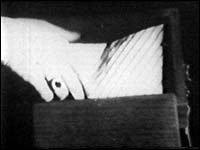Both girls are entranced by
lLornando and are soon weeping uncontrollably. The song
of the bizarre and theatrical Silencio, Ilorando also
serves to comment on the authenticity of song and the artificiality
of performance. The crying singer sings with a fluent, authentic
intensity but faints and collapses as the recorded song continues.
Although artificial, her own performance seems to fell her.
Lynch’s vision embraces both the artificiality of performance
and the emotional power of art. Music, live or recorded, possesses
a physical, visceral power. Singing is the most perfect individual
and physical form of expression. Moreover, the song IIorando
and the emotions engendered possess a surreal potency. The
singer faints from the passion surging through her and the women
cry copiously at the song’s tale of yearning and love lost.
As an expression of desire, it reveals the surreal binding of
love and death. Such experience corresponds with Georges Bataille’s
concept of sovereign eroticism. Bataille believes that in the
act of love, we break with temporal discontinuities to fuse
with the atemporal, discontinuous universe. In orgasm, we suffer
a “petite mort”(“a small death”) (4). To be human, moreover,
is to be conscious of death. It is indeed through art that we
attain such sovereign expression : “C’est dans ce monde
tragique. artificiel, qui naît l’extase. Sans doute tout objet
d’extase est crée par l’art”(“It is in this tragic, artificial
world that esctacy is born. Every object of esctacy is created
by art”). (5) In surrealist art, the loss of consciousness
is bound up with desire and death. Lynch’s characters engage
in the surreal act of fainting. The young man in the diner faints
on seeing the harbinger of death, the monstrous tramp. In Silencio,
Betty convulses and Rebekah del Rio collapses while singing.
As she recovers temporarily from the power of performance and
the shock of the real, Betty suddenly finds a blue box in her
bag, a blue box which can be opened with the fantastic blue
key. We see the women return home and enter the bedroom. Rita
turns to fetch the hidden key. Inexplicably, Betty disappears
and a solitary, bewildered Rita opens the box alone. We are
propelled into the box. The opening of the box marks the horrific
return to the reality of Betty’s life.
| |
 |
|
|
Lynch’s interest in the surreal is
further revealed in this blue box, a surreal object par excellence.
It reminds us perhaps of the box in Un Chien Andalou. A
peculiar striped box is worn around the neck of the cyclist
who falls from his bicycle. We see a woman - the lover - open
the box with a key which contains a necktie. Further, in a
separate sequence preceding her killing, a severed hand is
placed in the box by the young androgynous woman. In Bunuel’s
work, the surreal object, is related to fetishistic desire
and the castration complex. In his article Fetishism,
Freud asserts that the fetish serves to stem the male fear
of castration. It denotes a sexual fixation of the male unconscious.
The fetish functions as a stand-in for the mother’s penis
which is no more. The (dis) avowal of the female sex is expressed
in fetish objects. (6) Thus, the Freudian box embodies the
female sex. The director Adam’s spoiling of the contents of
his adulterous wife’s jewellery case represents the sublimated,
vengeful rape of his wife. In Mulholland Drive, the
blue box signifies the trauma of discovery and consciousness.
Diane’s dream is broken when Rita opens it. The audience is
projected into the receptacle to strange evacuating sounds
which signify a void. Specifically, the object, we will see,
symbolises Diane’s disempowerment. In the waking narrative,
the monstrous tramp who lurks behind the diner will ultimately
“own” the blue box. He could thus be said to be a demon bound
up with Diane’s decline and death. The raving hobgoblin old
couple, a reminder of her past who will haunt Diane first
appear the waking consciousness creeping out of the blue box.
On a diagetic level, we will also be informed directly by
the hitman that when Diane sees a normal blue key, Camilla’s
murder has been pulled off. Let us examine Diane’s decline
in detail.
|